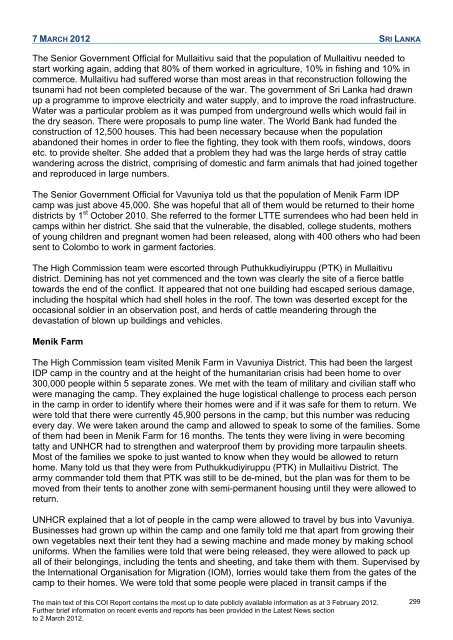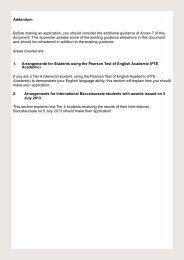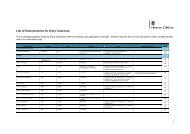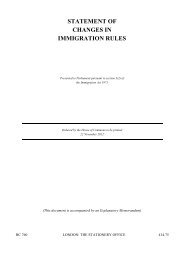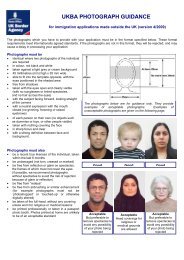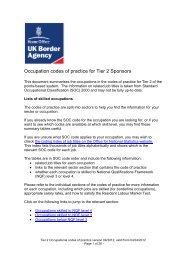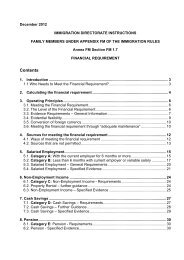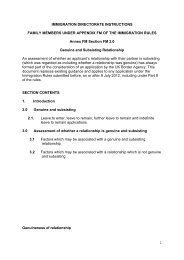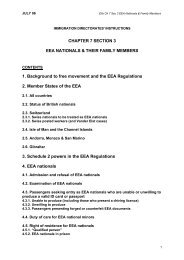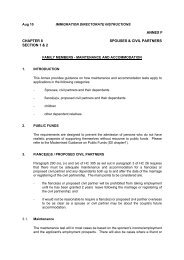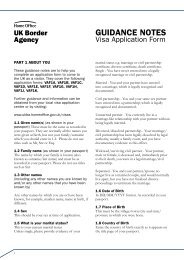COI Report March 2012 - UK Border Agency - Home Office
COI Report March 2012 - UK Border Agency - Home Office
COI Report March 2012 - UK Border Agency - Home Office
Create successful ePaper yourself
Turn your PDF publications into a flip-book with our unique Google optimized e-Paper software.
7 MARCH <strong>2012</strong> SRI LANKA<br />
The Senior Government Official for Mullaitivu said that the population of Mullaitivu needed to<br />
start working again, adding that 80% of them worked in agriculture, 10% in fishing and 10% in<br />
commerce. Mullaitivu had suffered worse than most areas in that reconstruction following the<br />
tsunami had not been completed because of the war. The government of Sri Lanka had drawn<br />
up a programme to improve electricity and water supply, and to improve the road infrastructure.<br />
Water was a particular problem as it was pumped from underground wells which would fail in<br />
the dry season. There were proposals to pump line water. The World Bank had funded the<br />
construction of 12,500 houses. This had been necessary because when the population<br />
abandoned their homes in order to flee the fighting, they took with them roofs, windows, doors<br />
etc. to provide shelter. She added that a problem they had was the large herds of stray cattle<br />
wandering across the district, comprising of domestic and farm animals that had joined together<br />
and reproduced in large numbers.<br />
The Senior Government Official for Vavuniya told us that the population of Menik Farm IDP<br />
camp was just above 45,000. She was hopeful that all of them would be returned to their home<br />
districts by 1 st October 2010. She referred to the former LTTE surrendees who had been held in<br />
camps within her district. She said that the vulnerable, the disabled, college students, mothers<br />
of young children and pregnant women had been released, along with 400 others who had been<br />
sent to Colombo to work in garment factories.<br />
The High Commission team were escorted through Puthukkudiyiruppu (PTK) in Mullaitivu<br />
district. Demining has not yet commenced and the town was clearly the site of a fierce battle<br />
towards the end of the conflict. It appeared that not one building had escaped serious damage,<br />
including the hospital which had shell holes in the roof. The town was deserted except for the<br />
occasional soldier in an observation post, and herds of cattle meandering through the<br />
devastation of blown up buildings and vehicles.<br />
Menik Farm<br />
The High Commission team visited Menik Farm in Vavuniya District. This had been the largest<br />
IDP camp in the country and at the height of the humanitarian crisis had been home to over<br />
300,000 people within 5 separate zones. We met with the team of military and civilian staff who<br />
were managing the camp. They explained the huge logistical challenge to process each person<br />
in the camp in order to identify where their homes were and if it was safe for them to return. We<br />
were told that there were currently 45,900 persons in the camp, but this number was reducing<br />
every day. We were taken around the camp and allowed to speak to some of the families. Some<br />
of them had been in Menik Farm for 16 months. The tents they were living in were becoming<br />
tatty and UNHCR had to strengthen and waterproof them by providing more tarpaulin sheets.<br />
Most of the families we spoke to just wanted to know when they would be allowed to return<br />
home. Many told us that they were from Puthukkudiyiruppu (PTK) in Mullaitivu District. The<br />
army commander told them that PTK was still to be de-mined, but the plan was for them to be<br />
moved from their tents to another zone with semi-permanent housing until they were allowed to<br />
return.<br />
UNHCR explained that a lot of people in the camp were allowed to travel by bus into Vavuniya.<br />
Businesses had grown up within the camp and one family told me that apart from growing their<br />
own vegetables next their tent they had a sewing machine and made money by making school<br />
uniforms. When the families were told that were being released, they were allowed to pack up<br />
all of their belongings, including the tents and sheeting, and take them with them. Supervised by<br />
the International Organisation for Migration (IOM), lorries would take them from the gates of the<br />
camp to their homes. We were told that some people were placed in transit camps if the<br />
The main text of this <strong>COI</strong> <strong>Report</strong> contains the most up to date publicly available information as at 3 February <strong>2012</strong>.<br />
Further brief information on recent events and reports has been provided in the Latest News section<br />
to 2 <strong>March</strong> <strong>2012</strong>.<br />
299


